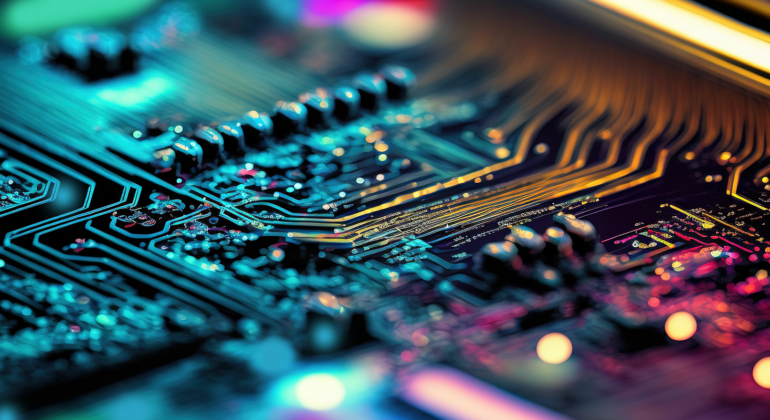AI Shines at Computex 2024
Artificial intelligence (AI) took center stage at Computex 2024, which showcased groundbreaking innovations poised to redefine personal computing, data center operations, AI servers, and smart factory technologies. This year’s Computex highlighted the transformative impact of AI, setting a new standard for future technology developments.
AI-enhanced PCs
Microsoft has set high standards for its Copilot+ PCs, ensuring robust performance and advanced AI capabilities. All Copilot+ PCs must include a neural processing unit (NPU) with at least 40 TOPS (TOPS measures the number of operations [additions, multiplications, etc.] executed within one second, in trillions), 16GB of memory, and 256GB of storage to provide strong AI performance for various applications.
- AMD’s Ryzen AI 300 Series Processors: At Computex, AMD unveiled the Ryzen AI 300 Series processors featuring the Strix Point architecture. These processors come equipped with an NPU capable of delivering 50 TOPS of computing power. AMD announced that branded devices featuring these processors are expected to launch in the third quarter of 2024, marking a significant leap in AI computing power.
- Intel’s Lunar Lake Processors: Intel introduced its Lunar Lake processors, which will be available starting in September. These processors boast an NPU with 48 TOPS, further pushing the boundaries of AI capabilities in personal computing. Intel’s new processors are designed to enhance performance and efficiency, catering to both consumer and enterprise markets.
- Qualcomm’s Snapdragon X Elite: Qualcomm had previously announced the Snapdragon X Elite chip in May, which provides 45 TOPS of NPU performance. PC models featuring this powerful chip are set to roll out from June 18, offering advanced AI functionalities and superior performance. Qualcomm’s presentations at Computex 2024 underscore its commitment to integrating AI directly into the PC sector. By leveraging its expertise in mobile hardware and software, Qualcomm is poised to carve a significant niche in the Windows PC market, aligning with broader industry trends toward AI-focused computing.
- NVIDIA’s GeForce RTX AI Notebooks: NVIDIA showcased GeForce RTX AI notebooks produced by partners such as ASUS and MSI. These notebooks feature advanced hardware specifications. Leveraging the latest NVIDIA AI libraries and SDKs, they are optimized for AI inferencing, training, gaming, 3D rendering, and video processing. They offer up to seven times faster Stable Diffusion and up to 10 times faster large language model inference than Macs, marking a significant leap in performance and efficiency. The new RTX AI Toolkit provides tuning, optimization, and deployment of Windows AI applications. NVIDIA also announced its own AI assistant, Project G-Assist, and development tools. G-Assist can help players inquire, respond to questions, or adjust system settings while playing games.
AI PC Features at Computex 2024
Several PC brands at Computex demonstrated advanced AI PC capabilities designed to enhance user experience and productivity. Key features included the recall function, which allows users to search for previously viewed documents by describing memory cues, and live captions with real-time translation for various media. Microsoft Paint’s Cocreator feature generates AI images and text from user input, while auto super resolution improves game image resolution and refresh rates without compromising performance. Additionally, AI enhancements in gaming products such as performance tuning, auto framing, eye contact correction, and video editing were showcased. Complementary software solutions from brands like ASUS (StoryCube and MuseTree), Acer (Sense), and Lenovo (AI Now) further highlight the integration of AI into personal computing.
Various brands are gearing up to launch AI PCs targeting both consumer and business markets in the second half of 2024. These AI-enhanced PCs are expected to come with a price increase of approximately 10% to 15%, reflecting the added value and capabilities they offer.
AI Server Innovations: GB200 NVL72 Systems Spotlight and Liquid Cooling Technology
At the NVIDIA GTC event, NVIDIA showcased the GB200 NVL72 rack, which connects 36 Grace CPUs and 72 Blackwell GPUs, providing 30 times the real-time inference speed for large language models with trillions of parameters. Due to the GB200’s outstanding performance and power efficiency, it garnered significant interest at Computex. Blackwell chips alone have a thermal design power (TDP) of up to 1,200 watts; when combined with Grace CPUs, the TDP can reach up to 1,500 watts. This high power density generates significant heat, necessitating an efficient cooling solution to maintain optimal performance and prevent overheating. Given that the GB200 NVL72 requires liquid cooling, there was considerable attention on liquid cooling technology at Computex. Several server brands and original design manufacturers (ODMs) demonstrated liquid cooling solutions integrated with cabinets.
Liquid cooling utilizes liquid as a heat transfer mechanism to dissipate heat generated inside the server, with two main types available: direct liquid cooling (DLC) or direct-to-chip (D2C) liquid cooling and immersion cooling.
- Direct Liquid Cooling: Involves sealed pipelines filled with coolant surrounding the server’s hottest components. Heat is conducted to the coolant via thermal copper plates and then flows out for dissipation. This can be implemented in air-cooled data centers (liquid-to-air) or through dedicated liquid cooling infrastructure (liquid-to-liquid).
- Immersion Cooling: Involves submerging server components directly into a cooling fluid, offering highly efficient heat dissipation. Heat is transferred to the liquid, which is then pumped to a heat exchanger to transfer the heat to cold water from a cooling tower.
Currently, immersion cooling solutions are gaining significant interest, with oil-based liquids being the preferred choice for the industry. However, immersion cooling technology still faces many challenges, such as the chemical reactions between dielectric fluids and various components, which require long-term testing of three to five years. Additionally, the materials of CPUs may slightly change with each generation, necessitating continuous testing by server manufacturers to keep up with these changes.
AI in Industrial Digitization: Smart Factories and Beyond
Industrial digitization was significantly highlighted at Computex, particularly through AI integration in smart factory applications. Major players showcased solutions to enhance automation, efficiency, and productivity.
NVIDIA’s approach to AI and robotics employs a three-computer system: an AI supercomputer for model creation in data centers, a runtime computer for real-time sensor processing in robots, and the Omniverse computer for digital twin simulation. This integrated setup enables comprehensive virtual testing and optimization of AI models and robotic systems.
Over the past decade, NVIDIA has developed the Omniverse platform, which it claims has reached a critical point in industrial digitalization. Leading manufacturers like Foxconn, Delta Electronics, Pegatron, and Wistron demonstrated AI and Omniverse adoption for factory digitalization, using digital twins to optimize layouts, test robots, and enhance safety.
Quanta Cloud Technology (QCT), Techman Robot, NVIDIA, and Siemens Digital Industries Taiwan showcased AI smart robot applications, combining 5G private networks, AI edge servers, robotic arms, SIMATIC Robot Pick AI, Industrial Edge systems, and the Omniverse platform for enhanced automation. KENMEC presented smart logistics solutions developed on NVIDIA Isaac Sim, utilizing smart warehousing 3D simulation fields, automated warehousing logic, digital twins, and automatic 3D scene generation. These innovations significantly reduce modeling time and achieve high-efficiency simulation results.
Computex 2024 demonstrated the critical role of AI in transforming industrial operations, paving the way for smarter, more efficient, and resilient manufacturing ecosystems. The advancements showcased this year underscore the transformative impact of AI across various sectors and set the stage for what’s to come.


